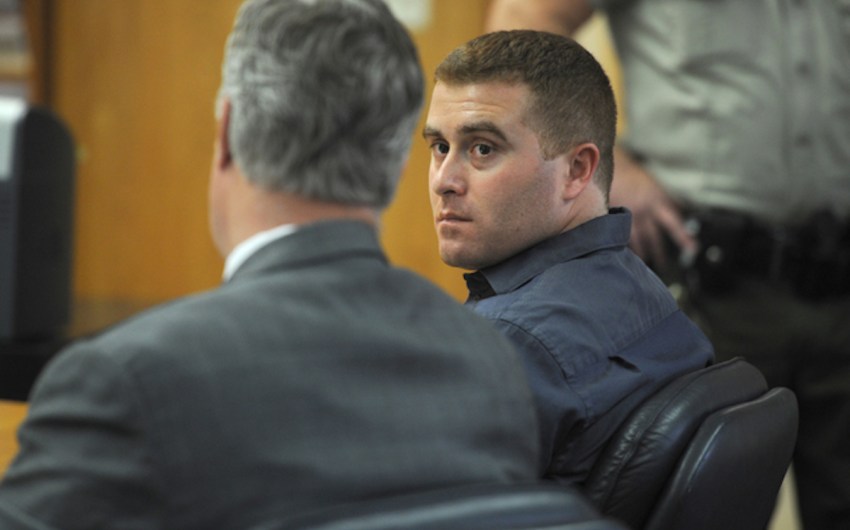Parents of Cora Vides, on Trial for Attempted Murder, Testify
Say They ‘Missed the Signs’ of Daughter’s Mental Illness

The attempted murder trial of Cora Vides, the former Laguna Blanca student who in 2021 stabbed her friend in the neck with a switchblade because she said “a bad thing” invaded her thoughts, continued this week.
Multiple emotional testimonies took place, notably from Joshua and Patti Vides, the parents of the accused, who recalled how “a good evening” turned into a nightmare.
The jury also heard from the Cottage Hospital doctors who treated the victim, Georgia Avery, when she arrived to the emergency room in critical condition.
“Critical condition means that death is imminent,” said Dr. Joseph Freeman. “Avery walked in as a Tier I trauma activation.”
“There was a lot of blood in her mouth,” Freeman recalled. After two failed attempts to intubate Avery, a medical procedure that takes breathing over for the patient, Freeman and his team used a manual “bag valve” in order to maintain her oxygen levels. The manual ventilation allowed for an anesthesiologist to intubate Avery through the wound, stabilizing her.
When asked by defense attorney Robert Sanger if he was worried that Avery was going to die, Freeman responded with one word — “yes.”
The police personnel who oversaw the case were also called to the stand. Among them was lead detective Eric Davis, who interviewed Vides on the night of the stabbing.
“I knew something bad was going to happen, but I knew it wasn’t going to be me,” Vides told Davis in an audio recording played for the court, in reference to the “bad thing” that had entered her mind leading up to the attack.
When asked about the seven-inch switchblade she received from her parents for her 18th birthday, Vides told Davis, “It was like the dream was filling itself out,” stating that the “thing” was like a “premonition … a story that pops into your head.”
The recording concluded with Vides saying, “I just feel like I hurt everyone.”
After a break in the proceedings, the jury heard testimony from Joshua Vides. “Me and my wife were woken up from a deep sleep by Cora, who was yelling that Georgia needs to get to the hospital right now,” Joshua began. “Cora was emphatic, hysterical — she couldn’t speak.”
A graphic video taken from the Vides family’s Nest camera was played, in which the family could be seen rushing a bloodied Avery into one of their cars. When asked why they didn’t think to call 9-1-1, Joshua sighed, stating that “a lot was going on.”
Despite the judge’s rejection of a previously filed “mental-health diversion” request that would have blocked Vides from any prison time, mental illness has been a central topic in the case. Joshua characterized his daughter as a “quiet, thoughtful, stoic person,” answering “yes” to the question of if he and his wife “missed the signals.”
When asked if he was aware that his daughter had been struggling with her mental health, Joshua stated that “there was stress.” “Cora had been uprooted from her home in Washington,” he said. “She had attended three high schools in three years,” but he and his wife were “not aware of anything other than stress.”
The prosecution asked one succinct question: “If someone had severe mental-health issues, would you give them a switchblade as a present?” Joshua responded with a regretful “no.”
Patti Vides testified that she herself has suffered from what she characterized as “severe depression,” which prompted the family to move from Washington state to Santa Barbara, where their older daughter was attending college.
The defense claimed that the family’s sudden move to California exacerbated Cora’s existing mental-health issues. Pattie said she was unaware of her daughter’s distress because of her own depression.
The trial continues this week.
Premier Events
Sat, Dec 21
11:00 AM
Santa Barbara
Mosaic Makers Market – Holiday Weekend Market
Sun, Dec 22
11:00 AM
Santa Barbara
Mosaic Makers Market – Holiday Market Finale
Wed, Dec 25
6:00 PM
Santa Barbara
FREE Contra Dance X-mas Day💃Corwin & Grace band6-9
Sat, Dec 21
11:00 AM
Santa Barbara
Mosaic Makers Market – Holiday Weekend Market
Sat, Dec 21
12:00 PM
Santa Barbara
Gift Wrapping with Life Chronicles
Sat, Dec 21
2:00 PM
Santa Barbara
State Street Ballet’s 30th Anniversary Production of ‘The Nutcracker’
Sat, Dec 21
4:00 PM
Santa Barbara
Wine + Painting Workshop
Sat, Dec 21
5:00 PM
Santa Barbara
The Rhythm Industrial Complex: Live at Fox Wine Co
Sat, Dec 21
5:00 PM
Santa Barbara
LET IT GLOW Winter Solstice on State St.
Sat, Dec 21
5:15 PM
Santa Barbara
The Longest Night Memorial
Sat, Dec 21
5:30 PM
Santa Barbara
First United Methodist Church Living Nativity
Sat, Dec 21
6:00 PM
Santa Barbara
Captain Fatty’s Ugly Xmas Sweater Party
Sat, Dec 21
6:30 PM
Santa Barbara
Ugly Sweater Singles 30s and 40s Party!
Sat, Dec 21 11:00 AM
Santa Barbara
Mosaic Makers Market – Holiday Weekend Market
Sun, Dec 22 11:00 AM
Santa Barbara
Mosaic Makers Market – Holiday Market Finale
Wed, Dec 25 6:00 PM
Santa Barbara
FREE Contra Dance X-mas Day💃Corwin & Grace band6-9
Sat, Dec 21 11:00 AM
Santa Barbara
Mosaic Makers Market – Holiday Weekend Market
Sat, Dec 21 12:00 PM
Santa Barbara
Gift Wrapping with Life Chronicles
Sat, Dec 21 2:00 PM
Santa Barbara
State Street Ballet’s 30th Anniversary Production of ‘The Nutcracker’
Sat, Dec 21 4:00 PM
Santa Barbara
Wine + Painting Workshop
Sat, Dec 21 5:00 PM
Santa Barbara
The Rhythm Industrial Complex: Live at Fox Wine Co
Sat, Dec 21 5:00 PM
Santa Barbara
LET IT GLOW Winter Solstice on State St.
Sat, Dec 21 5:15 PM
Santa Barbara
The Longest Night Memorial
Sat, Dec 21 5:30 PM
Santa Barbara
First United Methodist Church Living Nativity
Sat, Dec 21 6:00 PM
Santa Barbara
Captain Fatty’s Ugly Xmas Sweater Party
Sat, Dec 21 6:30 PM
Santa Barbara

























